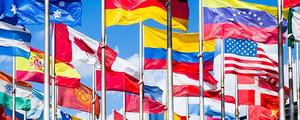Story Highlights
- Nearly half of French adults (48%) approved of the EU's leadership in 2021
- Nearly as many (45%) disapproved
- French still among the most disapproving of EU in the bloc
WASHINGTON, D.C. -- French adults are fonder of the European Union today than they were the last time they went to the polls, which could help pro-Europe President Emmanuel Macron's reelection chances on Sunday against Euroskeptic challenger Marine Le Pen.
Nearly half of French adults (48%) in 2021 approved of the leadership of the EU (which France currently holds the presidency of through the end of June), up from 39% shortly after Macron was elected in 2017.
Although French adults have warmed to the EU under Macron's leadership, they are still largely divided, which may aid Le Pen. Almost as many French adults (45%) disapproved of the EU's leadership in 2021, which ranks them among the most disapproving in the bloc, along with Greeks (50%) and Italians (46%).
EU's Leadership Gains Approval in Key Demographics
French people's attitudes toward Europe have long been marked by distrust and hostility that is still evident today, but European leadership has gained support in demographics that could be key in Sunday's election. These shifts suggest that more French people may be seeing the EU as a necessary platform for global influence and part of a solution to help regulate migration and protect France from the effects of globalization.
In the past five years, French approval of the EU's leadership rose in almost every income and age group of voters. The swings in approval were largest among the poorest French and voters younger than 50. Increases were more muted among the richest 20% of the French population and the oldest segment.
It is particularly telling that approval of EU leadership has increased among the poorest cohorts, considering that people in these demographics have tended to interpret Europe's neoliberal ideals and policies as a threat to their social benefits.
Implications
Ultimately, whomever the French choose on Sunday will likely decide their country's future role in Europe.
One choice is the pro-Europe incumbent Macron, who, since the beginning of his term, has offered a vision of a powerful, united Europe. Today, through tragic circumstances, Europe seems to have found a renewed sense of purpose and unity as it has come together to forcefully reject Russian President Vladimir Putin's war in Ukraine, a response Macron has played a key role in shaping.
It may be fortuitous for his candidacy, then, that this election is happening while France holds the six-month rotating presidency of the Council of the EU, providing a new platform for the candidate whose opponent may be in the uncomfortable position of having to defend her Euroskepticism.
France's other option is a populist candidate who is openly critical of the bloc. Although Le Pen has softened her anti-EU rhetoric and has downplayed her prior support for quitting the EU ("Frexit") and ditching the euro, much of her economic and political agenda still depends on weakening the EU. She has stated that she would modify France's constitution to assert its supremacy over European law and defend the country's national sovereignty.
To stay up to date with the latest Gallup News insights and updates, follow us on Twitter.
For complete methodology and specific survey dates, please review Gallup's Country Data Set details.
Learn more about how the Gallup World Poll works.


